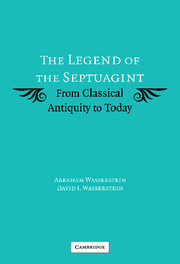Book contents
- Frontmatter
- Contents
- Preface and Acknowledgments
- Abbreviations
- Introduction
- 1 The Letter of Aristeas
- 2 The Hellenistic Jewish Tradition
- 3 The Rabbis and the Greek Bible
- 4 The Ptolemaic Changes
- 5 The Church Fathers and the Translation of the Septuagint
- 6 Among the Christians in the Orient
- 7 The Muslims and the Septuagint
- 8 Yosippon and the Story of the Seventy
- 9 Karaites, Samaritans and Rabbanite Jews in the Middle Ages
- 10 The Septuagint in the Renaissance and the Modern World
- Conclusion
- Appendix: In Partibus Infidelium: Zosimus of Panopolis
- Bibliography and Sources
- Index
3 - The Rabbis and the Greek Bible
Published online by Cambridge University Press: 17 July 2009
- Frontmatter
- Contents
- Preface and Acknowledgments
- Abbreviations
- Introduction
- 1 The Letter of Aristeas
- 2 The Hellenistic Jewish Tradition
- 3 The Rabbis and the Greek Bible
- 4 The Ptolemaic Changes
- 5 The Church Fathers and the Translation of the Septuagint
- 6 Among the Christians in the Orient
- 7 The Muslims and the Septuagint
- 8 Yosippon and the Story of the Seventy
- 9 Karaites, Samaritans and Rabbanite Jews in the Middle Ages
- 10 The Septuagint in the Renaissance and the Modern World
- Conclusion
- Appendix: In Partibus Infidelium: Zosimus of Panopolis
- Bibliography and Sources
- Index
Summary
The legend told in the Letter of Aristeas about the Greek translation of Scripture engaged the attention and stimulated the imagination of Jews and Christians alike. The Septuagint was important to the followers of both Palestinian religions. For some considerable time it served large parts of Diaspora Jewry and, to some extent, Jews in Palestine, as their only accessible text of the Bible to be used in worship and study as well as in proselytization and apologetics. The reasons for the high value attached to the Septuagint by the Christians were similar: as soon as Christianity ceased being merely a local, Palestinian, Jewish sect and became the religion of Greek-speaking gentiles, the Bible had to be read to the faithful and to potential converts in the only language many of them knew. Providentially, the Old Testament, the Jewish inheritance of the new Church, was available in the language in which the Gospel was to be preached to a large part of mankind. Hence Christians shared with Jews the desire to invest the Septuagint with an authority that could approach, perhaps even equal, that of the original revelation from Mount Sinai. In both traditions the text of the Greek Bible was thought to be literally inspired. Veneration for the text of the Septuagint among Jews in the Greek-speaking Diaspora is reflected in the Letter where, apart from the praises heaped on the excellence of the translation, the author reports expressions concerning the need to keep its text inviolable that are reminiscent of those that are found in the Torah itself about the Hebrew text.
- Type
- Chapter
- Information
- The Legend of the SeptuagintFrom Classical Antiquity to Today, pp. 51 - 83Publisher: Cambridge University PressPrint publication year: 2006



